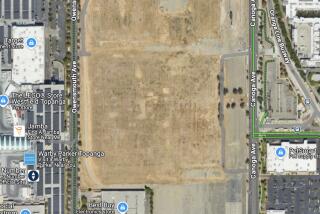PCB Spill at Point Loma Navy Facility Spurs Investigations
- Share via
A leaking transformer that spilled oil containing a suspected carcinogen on the floor of a U.S. Navy facility on Point Loma has led to an investigation by the Navy and an independent contractor, prompting a handful of employees to have their blood tested, a Navy official said Tuesday.
Joel Meriwether, a public affairs officer for the Naval Oceans Systems Center, said oil containing polychlorinated biphenyls (PCBs) spilled earlier this month from a transformer in “a closeted area” adjacent to a communications laboratory in Building 33 at the center.
Meriwether said the leak was cleaned up in about two hours. But he said the area around the closet has been closed off since the May 7 spill pending the results of analyses of air and surface samples taken by the Navy and a Garden Grove-based contractor.
Bruce Zike, an industrial hygienist with the contractor, Crosby and Overton Environmental Management Inc., said Tuesday that initial results “indicate that everything’s below the (U.S. Environmental Protection Agency) standards.”
Area to Be Reopened
However, the specific levels found were unavailable Tuesday.
Meriwether said a hazardous-materials team with the Navy’s Public Works Center had reached the same conclusion. He said officials at NOSC expected to reopen the area today once they have received a full report from Crosby and Overton.
Meriwether said that approximately 15 people were working in the vicinity at the time of the leak, which he said said did not spread beyond the closeted area. He said some workers had elected on their own to have blood tests, though he said he did not know the results.
He said no one was in the closeted area where the leak occurred.
Meriwether said results of consultants’ report would determine whether Navy officials would recommend blood tests for other employees. He said the transformer would be removed after the investigation is complete.
Meriwether said concern about the incident had been heightened by the fact that a power panel nearby began to emit smoke at the same time. He said there was no fire, and he did not know what had caused the smoke. He said the two incidents were unrelated.
Meriwether said NOSC elected not to report the spill to county hazardous-materials officials, not because the Navy is not required by law to report such incidents, but because “it’s our feeling that there was limited, if any, exposure and that the spill was small enough so that it did not require reporting outside.”
PCBs are man-made chlorinated hydrocarbons that were used for many years in transformers and capacitors. Production of PCBs was banned in 1978 in light of evidence that they cause cancer in animals and have harmful health effects on humans.
They still exist, however, in pre-1978 equipment. Firms and agencies that have such equipment are required by federal law to gradually phase out its use.
More to Read
Sign up for Essential California
The most important California stories and recommendations in your inbox every morning.
You may occasionally receive promotional content from the Los Angeles Times.













